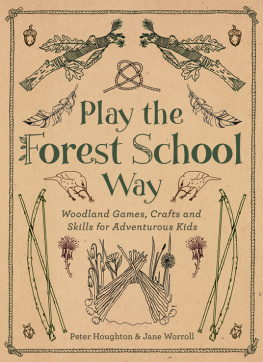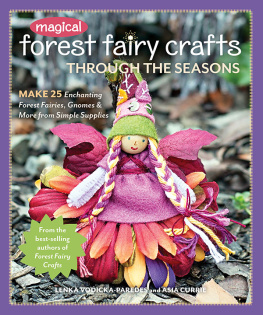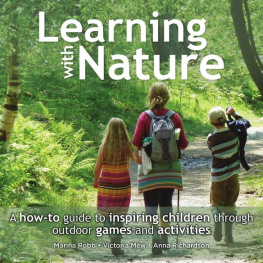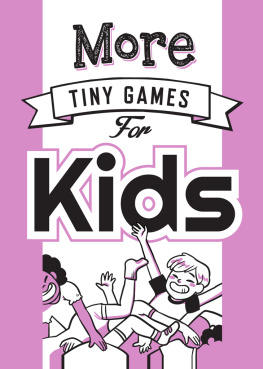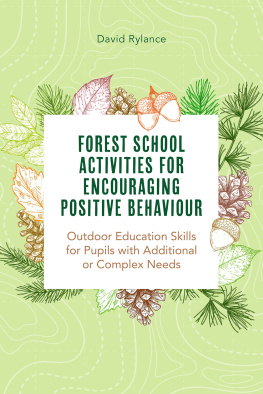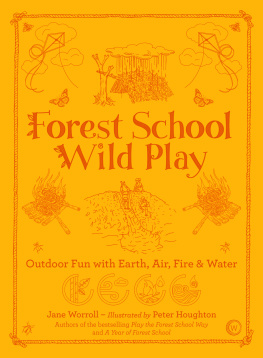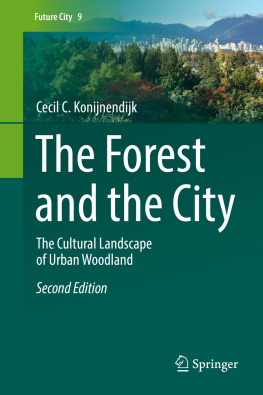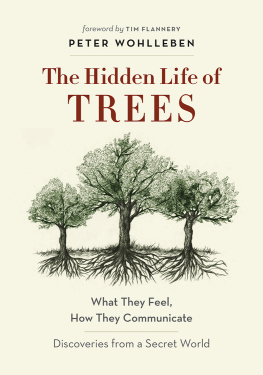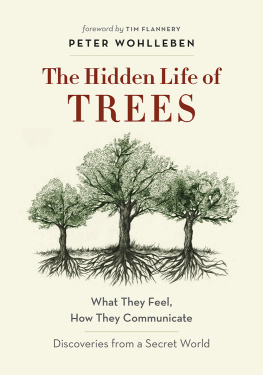Play the
Forest School
Way
Woodland Games, Crafts and
Skills for Adventurous Kids
Peter Houghton & Jane Worroll

CONTENTS
Introduction
Nature offers us a sanctuary, a place where we can find peace and wonder. It is not limited by time or confined by walls, and even today we cannot control it completely. It is much larger and older than we are, and its rhythms resonate deep within us. Nature is where we are from and where we belong, and our survival is intricately linked to its existence. For children it is the greatest playground of all, with all its diverse structures, smells, textures, its creatures of all shapes and sizes, its abundant plants, some edible, others toxic. Nature offers a myriad of opportunities for risk taking, for a wealth of learning and amazement, and for freedom, separate from the adult world.
So why has our society become so disconnected from nature? Along with strangers, increasing traffic and other hazards of the modern world, nature itself is often seen as something alien, a threat to our children. Changes in the way we live, including a rise in risk-adverse parenting, as well as an increasing dependence on technology, contribute to an ever-more sedentary, indoor culture that counts increasing childhood obesity as only one of its negative impacts. While some fears may be justified, its important to try to readdress these issues.
Forest School is one of many grassroots movements around the world that are currently aiming to connect children with nature once more. Now a global phenomenon, Forest School developed in the UK in the 1990s as both an approach to early years learning, initially inspired by the play-based, nature-centred pedagogy of Scandinavia known in Denmark as friluftsliv (free open-air life), and as an ever-growing collection of individual Forest Schools. These range from educational play schemes held in local parks and in mainstream schools to specialist programmes to help with addiction recovery and social inclusion. The Forest School Association, the independent body representing Forest School in the UK, has provided the following definition:
Forest School is an inspirational process, that offers all learners regular opportunities to achieve and develop confidence and self-esteem through hands-on learning experiences in a woodland or natural environment with trees.
This approach draws on, in addition to the Scandinavian outdoor model, the learning theories and playful child-centred pedagogy of thinkers such as Rudolf Steiner and Maria Montessori, and on the nature-based education activities of Kurt Hahn and the British Scouting and Woodcraft Folk movements, among other influences. These views have relevance for Forest School today, with its ethos of therapeutic educational learning that aims to maximize social, emotional and developmental potential by allowing children to manage risk, have more independence in guiding their own learning, achieve goals, be active, play and learn through direct experience within nature. Within this context, a Forest School leader assesses each childs interests and learning styles and engages with them to facilitate their full learning ability. Outside the confines of four walls, without the distractions of electronic devices and excessive supervision, children can move, explore and discover at their own pace, connecting to the natural world a place not created by man, that had deep spiritual meaning for our ancestors.
This book offers some fantastic games, crafts and skill-building activities from the Forest School sessions we hold in London and elsewhere, giving children who have not yet had a chance to attend Forest School a taste of what goes on there. And for children who have already discovered Forest School, this is a way of bringing those activities into their outdoor play and learning with you. Of course a book can never be a replacement for the full Forest School experience, which requires repeated sessions with an appropriately trained leader (for more about the principles of Forest School, visit the FSA website at www.forestschoolassociation.org). So we urge children who havent already been to Forest School to try it out for themselves!
Above all, this book is about having fun in nature, especially in woodland. However, a Forest School programme aims to stimulate a childs holistic development and for this reason we explain the learning benefits of each activity in the book. For example, using a fire steel (under adult supervision of course) is a skill that takes time, focus, patience, persistence and resilience to master. Success can truly empower a child, raising confidence to try new skills and encouraging a healthy approach to managing risk. We never tire of seeing the sheer joy flash across the face of a child who has persevered and finally triumphed in lighting a fire using just a fire steel!
Children are immensely curious and have a strong desire to play and explore the world around them, and by making choices in this way they actively drive their own learning and development. Research suggests that young children learn best from experience, by using their senses actively rather than passively, and it is via these experiences that the learning remains with us into adulthood. Providing varied outdoor experiences can help with this development. Free play gives children space and independence, and a chance to imagine and learn social skills, while adult-guided activities such as tool use build new skills, vocabulary and the ability to manage risk, creating a positive self-identity and laying foundations to be a successful lifelong learner.
HOW TO PLAY THE FOREST SCHOOL WAY!
Weve written this book for parents, teachers and guardians who will take the role of the Forest School leader in being present (so put your phone away!), encouraging, inspiring and helping the activity to be achieved, at the same time letting the child lead the experience. The activities are suitable for a wide age range, from pre-school children up to about age 11, so obviously adults will need to assess the individual capabilities of each child.
Weve suggested kit for each activity. In addition, bring a first-aid kit, and a supply of water, soap and paper towels for cleaning hands. Getting dirty without having to worrying about it is part of playing outdoors and activities can take place in all weathers (apart from high winds in woods), so make sure everyone is dressed appropriately in clothes that dont need to be kept clean.
Each Forest School session has a beginning and an ending, and its own flow; this framing and rhythm can provide inspiration for your own woodland activities. At Forest School, beginnings establish safety rules and the physical boundaries of the play area, and how to treat each other and the environment with respect (if you are in a protected area, check with the landowner about rare plants that should not be picked, and animals not to disturb). We also discuss issues such as where food will be kept and where to wash hands. This reflects psychologist Abraham Maslows theory of the hierarchy of needs, in which basic needs, such as those for food, shelter, safety and community, must be met first to allow children to achieve their full potential for personal development.
One key aspect to establish before deciding on the first activity is mood and level of energy. You can ask older children to rate their feelings on a scale of 1 to 10, with 1 being no good and 10 being great. Ask small groups directly or get large groups sitting in a circle and use a talking stick (see ) to encourage them to share their thoughts and feelings. Let the words come from them, and use these and your observations as clues as you plan your session or day.
Next page
